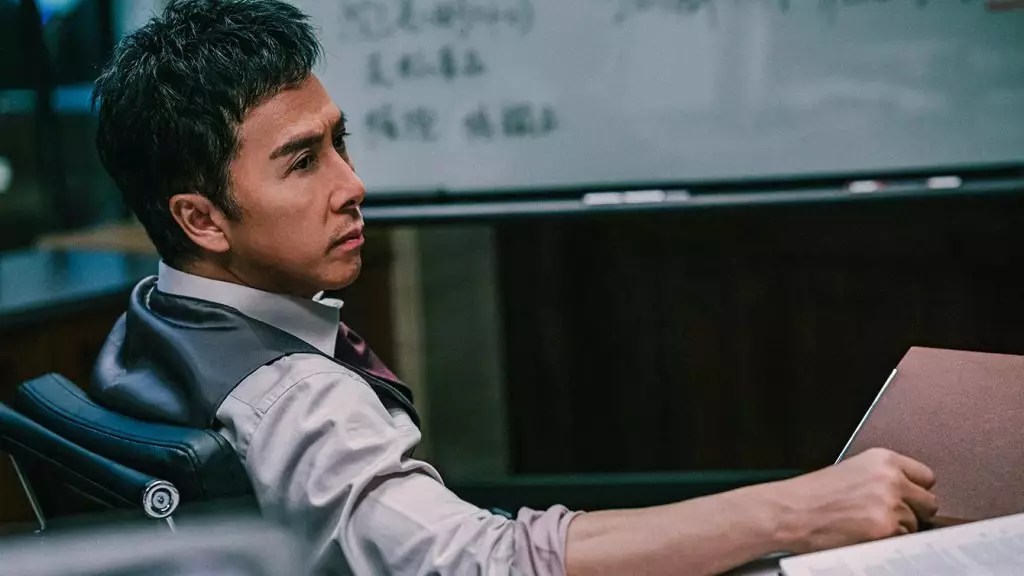In the captivating yet complex legal drama “The Prosecutor,” Donnie Yen takes on an ambitious role that marries action and legal intricacies. Portraying Fok Chi Ho, a former police officer turned prosecutor, Yen navigates a justice system that often dilutes the righteousness that initially propelled him toward the law. This film, which is a departure from Yen’s traditional action-packed fare, seeks to explore the tension between law enforcement and judicial processes—a theme that resonates especially in the context of Hong Kong’s changing political landscape. However, while “The Prosecutor” aims high, it occasionally stumbles under its weighty aspirations, leaving audiences in limbo between action fantasy and courtroom reality.
The tension between Yen’s established action persona and the serious themes of the screenplay emerges early. Directed by Yen himself, the film is told through a lens that combines tension-filled sequences with courtroom drama. Yet, the transition from high-octane action to legal proceedings is not as seamless as one might hope. Intended to showcase the fragility and significance of the legal system, “The Prosecutor” too often leans heavily into its didactic elements, bombarding the audience with dense legal jargon at a relentless pace. For viewers not well-versed in legal complexities, this might prove to be overwhelming and detracts from the dramatic engagement that the story seeks to elicit.
Yen’s portrayal of Fok is not devoid of merit. He presents his character as a man of principle—a prosecutor seeking justice in a world that often prioritizes efficiency over morality. His dedication is notably contrasted with the attitudes of his colleagues, who appear more inclined to close cases quickly than to uphold true justice. This dynamic raises compelling questions about moral compromise in the pursuit of legal expediency. Yet, while Fok’s journey is rooted in relatable frustrations, his character’s depth feels relatively superficial, relegating him to a mere embodiment of the film’s ideals rather than a fully realized individual.
The supporting cast, including the ever-reliable Francis Ng and Michael Hui, provides robust performances that help to elevate the narrative. Each brings their unique flair to a story that might otherwise falter under the weight of its informational load. Hui, in particular, shines as the disillusioned judge caught between the rigid application of the law and the moral nuances of each case—a character that mirrors the complexities faced by many in the legal profession today. Ultimately, the film’s success in character development relies on the audience’s investment in these secondary figures, which may detract from the focal narrative of Fok’s legal struggles.
Action Elements: A Mixed Bag
While “The Prosecutor” seeks to blend genres, the action sequences come off as both a highlight and a hindrance. Yen, aware of the limitations of his age as a martial arts star, strategically places the more physically demanding scenes in the hands of younger actors like MC Cheung. This clever decision ensures that the film retains its action roots while acknowledging the natural evolution of its lead. However, when Fok eventually faces off against criminals in the film’s climax, the build-up feels disjointed. It seems as if the earlier focus on litigation and procedure was merely a pretext, hastily shifting back to a more traditional action format that may leave die-hard fans of Yen’s martial arts escapades feeling shortchanged.
Echoing the ongoing sociopolitical shifts in Hong Kong, the film cleverly weaves a sense of urgency into its narrative arc. The looming influence of the National Security Law punctuates the backdrop of Fok’s fight for justice, enhancing the weight of every courtroom drama and highlighting the precarious nature of truth in a contentious legal framework. Thus, audiences are prompted to reflect on the broader implications of “justice” in a world where the legal system is continually tested by sociopolitical strife.
“The Prosecutor” emerges as an ambitious project—one that tries to find its footing amid the intricate dance of legal drama and thrilling action. While it succeeds in sparking meaningful conversations around justice and ethics, it often loses its balance in execution. With an over-reliance on scriptural facts and legal processes, it can sometimes feel heavy-handed, risking alienation of viewers not versed in legal parlance. Even so, the film offers a timely commentary that resonates in our current climate, making it a noteworthy if flawed addition to Yen’s expanding portfolio. Ultimately, it leaves us to ponder: how do we reconcile the ideals of justice with the reality of its flawed implementation? As audiences exit the theater, they may find such questions linger long after the credits roll, reflecting the ongoing struggle for justice that remains ever-relevant.


Leave a Reply